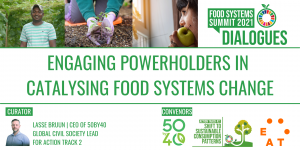Официальная обратная связь диалога для Саммита ООН по продовольственным системам 2021 года
Виды диалогов
Организатор
Язык диалога
Дата/время
Окончание
Местоположение
Формат
Просьба ознакомиться с приводимыми ниже данными для получения регистрационной информации, если таковая имеется, или обратитесь к руководителю диалога, если желаете принять участие.
Куратор
Описание
You are hereby invited to an Independent UN Food Systems Dialogue ‘Engaging Powerholders in Catalysing Food Systems Change,’ convened by 50by40 and Action Track 2 of the UN Food Systems Summit, led by Dr. Gunhild Stordalen, Executive Chair of EAT.
Global Civil Society has an incredible role to play to ensure inclusivity and actionability of the key outcomes of the UN Food Systems Summit in 2021. Civil society is not only a core part of accountability mechanisms that go into transforming a system but a key implementer.
50by40 and Action Track 2 of the UN Food Systems Summit are convening an independent UN Food Systems Summit Dialogue ‘Engaging Powerholders in Catalysing Food Systems Change.’ The event will bring together a wide range of stakeholders, including civil society groups, the private sector, and national, regional, and international bodies. The event aims to identify prerequisites for timely and impactful implementation across all levels of engagement following the recommendations made at the UN Food Systems Summit in September 2021.
Key question:
What are the concrete steps key stakeholders/powerholders can take, from the perspective of civil society, to action recommendations coming out of the Summit?
The core part of the event will be breakout discussions organised around different stakeholder groups:
- Intergovernmental
- National
- Subnational
- Citizens/Consumers
- Private sector
Questions that will be addressed in the breakout session:
- How to ensure that the key recommendations are both inclusive, ambitious and actionable?
- How to make them applicable and linked to other existing processes and multilateral frameworks?
- What actors at each level of food systems should do to take these recommendations forward?
- How to empower key actors of the food systems to facilitate a successful implementation?
Expected outcomes:
As a conversation-starter, the event will serve as an important step towards the Pre-Summit in July. It is expected that the event will generate a critical set of suggestions from civil society representatives for each of the stakeholder groups identified below on how to ensure inclusivity and actionability of the Summit outcomes, as well as determine a pathway for taking these outcomes forward.
Background information:
Five years after adopting the 2030 Agenda, it is clear no country will realize all of the 17 SDGs with a business-as-usual mindset. Holistic and interdisciplinary thinking will be needed to reexamine cross-cutting issues amongst the SDG’s and how the larger systems they sit within impact one another. Acknowledgment that food systems, particularly, shifting to sustainable consumption all levels of society to build consumer demand for sustainably produced food, strengthen local value chains, and improve nutrition, especially among the most vulnerable.
If we plan to eliminate wasteful patterns of consumption and facilitate a transition toward sustainable food systems, actionable short, medium, and long-term benchmarks will have to be put in place to manage evolving risks. change in attitudes and emerging challenges. Civil society will have to engage at all levels — intergovernmental, regional, national, subnational, the private sector, and individuals to make actionable implementation decisions to transform our food systems.
About convenors:
50by40 is a global coalition of organisations working towards a fair, healthy and compassionate food system achieved through a just transformation of our farming system.
Action Track 2 is one of the Action Tracks of the UN Food Systems Summit happening in September 2021. It works to build consumer demand for sustainably produced food, strengthen local value chains, improve nutrition, and promote the reuse and recycling of food resources, especially among the most vulnerable.


